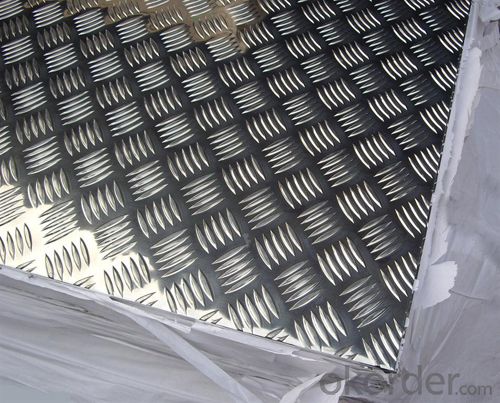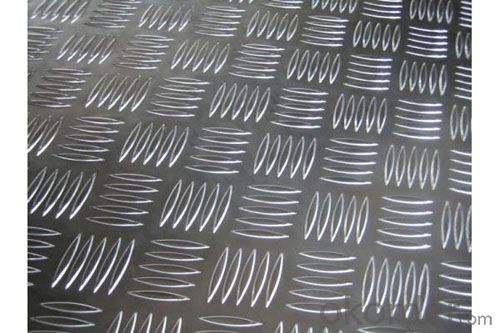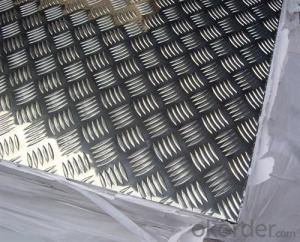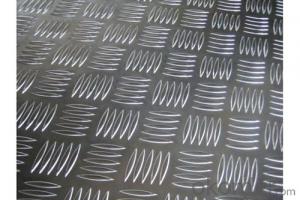Auminium Tread Plate with Five Bars Embossed Sheet
- Loading Port:
- China main port
- Payment Terms:
- TT OR LC
- Min Order Qty:
- 5 m.t.
- Supply Capability:
- 10000 m.t./month
OKorder Service Pledge
OKorder Financial Service
You Might Also Like
Item specifice
1. Description of Auminium Tread Plate with Five Bars Embossed Sheet
Alloy: 1050, 1060, 1100, 3003, 3005, 3105, 5052, etc
Thickness: 0.2mm~20mm
Temper: H14, 18, 24, 26, 32
Width: 10mm- 1500mm
2. Application of Auminium Tread Plate with Five Bars Embossed Sheet
(1).Interior: wall cladding, ceilings, bathrooms, kitchens and balconies, shutters, doors...
(2).Exterior: wall cladding, facades, roofing, canopies, tunnels,column covers , renovations...
(3).Advertisement: display platforms, signboards, fascia, shop fronts...
3. Feature of Auminium Tread Plate with Five Bars Embossed Sheet
*Such coil is specially designed to replace aluminum ingot, due to the high export tax of aluminum ingot, the coil has better price than ingot.
*This type of coil can fit customer's remelting furnace just like ingot, no need to make any change to the production line that was previously used for ingot. The standard coil size and weight is very suitable for the feed gate of furnace.
*This type of coil causes less material wastage than ingot when remelted.
*Our coil is made directly from ore, no need to go though the ingot making process, quality is much better than other suppliers who use ingot scrap to make coil.
Be free from Oil Stain, Dent, Inclusion, Scratches, Stain, Oxide Dicoloration, Breaks, Corrosion, Roll Marks, Dirt Streaks and other defect which will interfere with use
4. Certificate:
SGS and ROHS(if client request, paid by client), MTC(plant provided), Certificate of Origin(FORM A, FORM E, CO), Bureau Veritas and SGS (if client request, paid by client), CIQS certificate
5. Image of Auminium Tread Plate with Five Bars Embossed Sheet


6. Package and shipping of Auminium Tread Plate with Five Bars Embossed Sheet
eye to sky
eye to wall
with wooden pallet (wooden case also available)
7. FAQ
1) What is the delivery time?
Dpends on actual order, around 20 days
2) What is the QC system:
We have QC staff of 20 persons and advanced equipment, each production is with MTC traced from Aluminum ingot lot.
3) What market do you mainly sell to?
Australia, America, Asia, Middle East, Western Europe, Africa etc
- Q:Can aluminum coils be used in the manufacturing of appliances?
- Indeed, the utilization of aluminum coils in appliance manufacturing is possible. Aluminum, renowned for its lightweight and robust nature, is frequently employed in the manufacturing sector due to its exceptional thermal conductivity and ability to resist corrosion. Such attributes render it suitable for an array of applications, including the creation of heating and cooling systems found in appliances like refrigerators, air conditioners, and ovens. In these appliances, aluminum coils are frequently employed to facilitate efficient heat transfer and guarantee optimal functionality. Furthermore, aluminum represents a sustainable option as it is eminently recyclable, thus presenting appliance manufacturers with an environmentally conscious choice.
- Q:Are aluminum coils suitable for corrosion-resistant applications?
- Yes, aluminum coils are suitable for corrosion-resistant applications. Aluminum has a natural oxide layer that forms on its surface, which provides excellent corrosion resistance. This oxide layer acts as a barrier, protecting the underlying aluminum from corrosion caused by moisture, chemicals, and other environmental factors. Additionally, aluminum can be further enhanced with various coatings or treatments to improve its corrosion resistance even more. Therefore, aluminum coils are commonly used in applications where resistance to corrosion is crucial, such as in the construction industry, automotive industry, and marine applications.
- Q:Can aluminum coils be used for architectural facades?
- Yes, aluminum coils can be used for architectural facades. Aluminum is a popular choice for architectural facades due to its lightweight nature, durability, and versatility. Aluminum coils can be easily formed into various shapes and sizes to create innovative and visually appealing facades. The material is resistant to corrosion, making it suitable for outdoor applications. Additionally, aluminum can be easily coated or finished to enhance its aesthetic appeal and protect it from environmental elements. Overall, aluminum coils offer a cost-effective and sustainable solution for architectural facades.
- Q:What are the potential applications of coil-annealed aluminum coils?
- Coil-annealed aluminum coils have a wide range of potential applications in various industries. One potential application is in the automotive industry. Coil-annealed aluminum coils can be used to manufacture lightweight parts and components for vehicles. The lightweight nature of aluminum makes it an ideal material for improving fuel efficiency and reducing emissions. These coils can be used to produce body panels, chassis components, and structural parts in automobiles. Another potential application is in the construction industry. Coil-annealed aluminum coils can be used to manufacture roofing, siding, and wall cladding materials. The corrosion-resistant properties of aluminum make it a suitable choice for outdoor applications where durability is important. Additionally, the lightweight nature of aluminum makes it easier to handle and install, reducing labor and transportation costs. Coil-annealed aluminum coils can also find applications in the packaging industry. Aluminum is a great choice for food and beverage packaging due to its non-toxic, odorless, and impermeable qualities. These coils can be used to produce cans, foil wraps, and pouches, providing a safe and hygienic packaging solution. Furthermore, coil-annealed aluminum coils can be used in the electrical and electronics industry. Aluminum has excellent electrical conductivity, making it suitable for power transmission lines, electrical components, and heat sinks for electronic devices. Its lightweight nature also makes it easier to handle and install in various electrical applications. Overall, the potential applications of coil-annealed aluminum coils are diverse and span across several industries. From automotive to construction, packaging to electrical, the versatility, durability, and lightweight properties of aluminum make it an excellent choice for various manufacturing needs.
- Q:Are aluminum coils compatible with other building materials?
- Yes, aluminum coils are generally compatible with other building materials. Aluminum is a versatile material that can be used in various construction applications. It is commonly used for roofing, cladding, gutters, and other exterior elements of buildings. Aluminum's lightweight nature and corrosion resistance make it easy to integrate with other materials such as wood, concrete, glass, and steel. Additionally, aluminum coils can be easily shaped and formed to fit the desired design requirements, allowing for seamless compatibility with different building materials.
- Q:How much can i get for a gallon filled with aluminum Tabs from cans
- Aluminum is not sold by the gallon, it is sold by the pound, so you need to weigh what you have to determine what it is worth. Aluminum is not expensive, so the price you can expect is around 30 to 60 cents per pound.. Contact local recycling centers near you to find out what the going rate for is in your area.
- Q:Can aluminum coils be used for gutter systems?
- Indeed, gutter systems can employ aluminum coils. The lightweight property, durability, and resistance to rust and corrosion make aluminum a favored material for gutters. It is common practice to utilize aluminum coils to shape seamless gutters, which present benefits such as reduced leakage and an enhanced visual appeal. Moreover, maintaining aluminum gutters is effortless, and they can be painted to harmonize with a building's exterior. All in all, aluminum coils are a fitting and frequently employed option for gutter systems.
- Q:Tossing away an aluminum can wastes as much energy as pouring out half of that can’s volume of gasoline.what does that mean?
- There are two actions going on here. Throwing away a can and pouring out gasoline. Both are examples of wasting energy and the writer was trying to put a visual to the comparison. Since cans come in various sizes, the amount of energy is relative to the size of the can. For example, throwing out a 12 oz can is the same as pouring out 6 oz of gas.
- Q:Are there any limitations on the width-to-thickness ratio of aluminum coils?
- Yes, there are limitations on the width-to-thickness ratio of aluminum coils. The specific limitations depend on various factors such as the intended application, manufacturing process, and the mechanical properties of the aluminum alloy being used. Generally, a higher width-to-thickness ratio can result in increased material instability, difficulty in handling, and potential quality issues. Therefore, it is necessary to carefully consider these factors and consult industry standards and guidelines to determine the appropriate width-to-thickness ratio for aluminum coils.
- Q:How are aluminum coils used in the production of electronic devices?
- Aluminum coils play a crucial role in the production of electronic devices. They are commonly used as the primary material for manufacturing the internal components of electronic devices such as transformers, inductors, and electromagnets. These coils are made by winding aluminum wire around a core, creating a compact and efficient conductor for electrical currents. In transformers, aluminum coils are utilized to transfer electrical energy between two or more circuits. These coils enable voltage transformation by utilizing electromagnetic induction, where a varying current in one coil induces a voltage in another coil. This process is vital in stepping up or stepping down voltage levels, allowing efficient power distribution in electronic devices and electrical systems. Inductors, another essential component in electronic devices, are made using aluminum coils. An inductor resists changes in electrical current and stores energy in its magnetic field. Aluminum coils provide low resistance, high conductivity, and can handle high-frequency currents, making them ideal for inductor applications. They are used in various electronic devices such as power supplies, speakers, and filters to control current flow and regulate voltage. Additionally, aluminum coils are employed in the production of electromagnets, which are widely used in electronic devices. Electromagnets are created by passing an electric current through a coil to generate a magnetic field. Aluminum coils are preferred due to their lightweight nature and good thermal conductivity, allowing efficient heat dissipation in high-power applications. Furthermore, the use of aluminum coils in electronic devices offers advantages such as cost-effectiveness, lightweight construction, and excellent electromagnetic properties. The lightweight nature of aluminum enables the production of compact and portable electronic devices, making them more convenient for users. Moreover, aluminum's high thermal conductivity ensures efficient heat dissipation, which is crucial for preventing overheating and maintaining the proper functioning of electronic devices. In conclusion, aluminum coils are extensively used in the production of electronic devices for various applications such as transformers, inductors, and electromagnets. Their excellent electrical conductivity, lightweight construction, and thermal conductivity make them an ideal choice for efficient and reliable performance in electronic devices.
1. Manufacturer Overview |
|
|---|---|
| Location | |
| Year Established | |
| Annual Output Value | |
| Main Markets | |
| Company Certifications | |
2. Manufacturer Certificates |
|
|---|---|
| a) Certification Name | |
| Range | |
| Reference | |
| Validity Period | |
3. Manufacturer Capability |
|
|---|---|
| a)Trade Capacity | |
| Nearest Port | |
| Export Percentage | |
| No.of Employees in Trade Department | |
| Language Spoken: | |
| b)Factory Information | |
| Factory Size: | |
| No. of Production Lines | |
| Contract Manufacturing | |
| Product Price Range | |
Send your message to us
Auminium Tread Plate with Five Bars Embossed Sheet
- Loading Port:
- China main port
- Payment Terms:
- TT OR LC
- Min Order Qty:
- 5 m.t.
- Supply Capability:
- 10000 m.t./month
OKorder Service Pledge
OKorder Financial Service
Similar products
New products
Hot products
Hot Searches
Related keywords




























